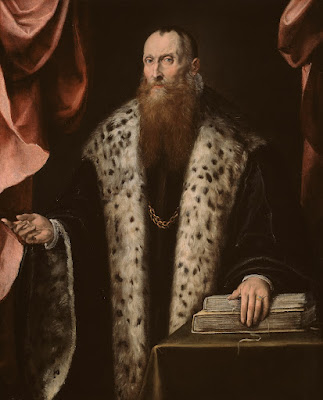-Graphische-Sammlung-Albertina-Vienna.jpg) |
| Barthel Beham Portrait of Herzog Wilhelm IV von Bayern ca. 1534 pastel on paper Graphische Sammlung Albertina, Vienna |
-Portrait-of-a-Dignitary-c1537-40-oil-on-panel-Kunsthistorisches%20Museum-Vienna.jpg) |
| Parmigianino (Francesco Mazzola) Portrait of a Dignitary ca. 1537-40 oil on panel Kunsthistorisches Museum, Vienna |
 |
| Pietro Marescalchi Portrait of a Gentleman ca. 1540-50 oil on canvas Art Institute of Chicago |
 |
| Hans Holbein the Younger Portrait of a Young Merchant 1541 oil on panel Kunsthistorisches Museum, Vienna |
 |
| Lavinia Fontana Portrait of a Man in his Study ca. 1577-78 oil on canvas Musée des Beaux-Arts de Bordeaux |
 |
| Bernardo Strozzi Portrait of Doge Francesco Erizzo ca. 1631 oil on canvas Kunsthistorisches Museum, Vienna |
 |
| Johann Ulrich Mayr David with the Head of Goliath ca. 1655 oil on canvas Deutsche Barockgalerie, Augsburg |
 |
| Anonymous French Artist Portrait of Madame Peyrot de Lugagnac ca. 1750 oil on canvas Musée Carnavalet, Paris |
 |
| Luigi Crespi Portrait of a Woman ca. 1760-70 oil on canvas Harvard Art Museums |
 |
| Philipp Veit Portrait of Marie du Fay, Baroness Bernus 1838 oil on canvas Städel Museum, Frankfurt |
 |
| Isacco Gioacchino Levi Cain contemplating his Crime ca. 1851 oil on canvas Galleria Nazionale di Parma |
-Clark-Art-Institute-Williamstown-Massachusetts.jpg) |
| John Singer Sargent Woman with Furs ca. 1880-85 oil on canvas (sketch) Clark Art Institute, Williamstown, Massachusetts |
-1883-oil-on-canvas-State-Tretyakov-Gallery-Moscow.jpg) |
| Ivan Kramskoy Portrait of a Woman (in use commercially as representation of Anna Karenina) 1883 oil on canvas State Tretyakov Gallery, Moscow |
 |
| Henri de Toulouse-Lautrec Elsa, called The Viennese 1897 lithograph Statens Museum for Kunst, Copenhagen |
 |
| Anders Zorn Portrait of Maja von Heijne 1900 oil on canvas Alte Nationalgalerie, Staatliche Museen zu Berlin |
-1910-lithograph-(poster)-Kunstbibliothek-Staatliche-Museen-zu-Berlin.jpg) |
| Richard Roland Holst Marsyas (Mythological Comedy) 1910 lithograph (poster) Kunstbibliothek, Staatliche Museen zu Berlin |
"Cursed may I bee," cri'd he, "if ever I take comfort, having such cause of mourning: but because you are, or seeme to be afflicted, I will not refuse to satisfie your demand, but tell you the saddest storie that ever was rehearsed by dying man to living woman, and such a one, as I feare will fasten too much sadnesse in you; yet should I denie it, I were too blame, being so well knowne to these senselesse places; as were they sensible of sorrow, they would condole, or else amased at such crueltie, stand dumbe as they doe, to find that man should be so inhumane. Then faire Shepherdesse, heare my selfe say my name is Perissus, Nephew I am to the King of Sicilie, a place fruitfull and plentifull of all things; onely niggardly of good nature to a great man in that Country, whom I am sure you have heard me blame in my complaints. Heire I am as yet to this King mine Uncle; and truly may I say so, for a more unfortunate Prince never lived, so as I inherit his crosses, howsoever I shall his estate. There was in this Country (as the only blessing it enjoyed) a Lady, or rather a Goddesse for incomparable beautie, and matchles vertues, called Limena, daughter to a Duke; but, Princesse of all hearts: this starre comming to the Court to honour it with such light, it was in that my blessed destinie to see her, and be made her servant, or better to say, a slave to her perfections; thus long was I happie, but now begins the tragedie: for warres falling out betweene the people and the Gentlemen, the King was by the people (imagining he tooke the other part) brought into some danger, and so great an one, as rudenes joynd with ill nature could bring him into, being at last besieged in a strong hold of his, all of us his servants, and gentle subjects, striving for his good and safetie; in this time nothing appearing but danger, and but wise force to preserve mens lives and estates unto them, every one taking the best meanes to attaine unto their good desires."
– from The Countesse of Mountgomeries Urania, by the right honourable the Lady Mary Wroath, daughter to the right noble Robert, Earle of Leicester, and neece to the ever famous and renowned Sʳ Phillips Sidney knight, and to ye most excellant Lady Mary Countess of Pembroke, late deceased (London: John Marriott and John Grismand, 1621)